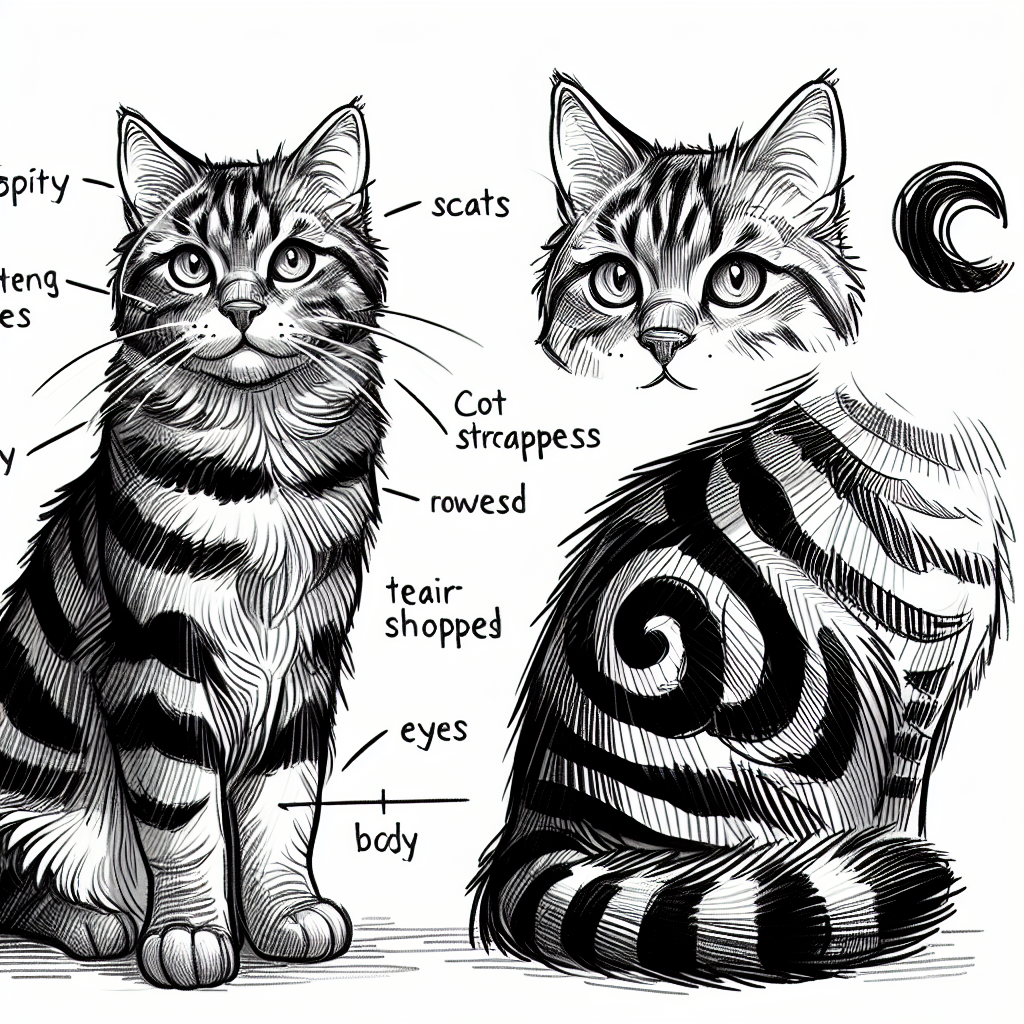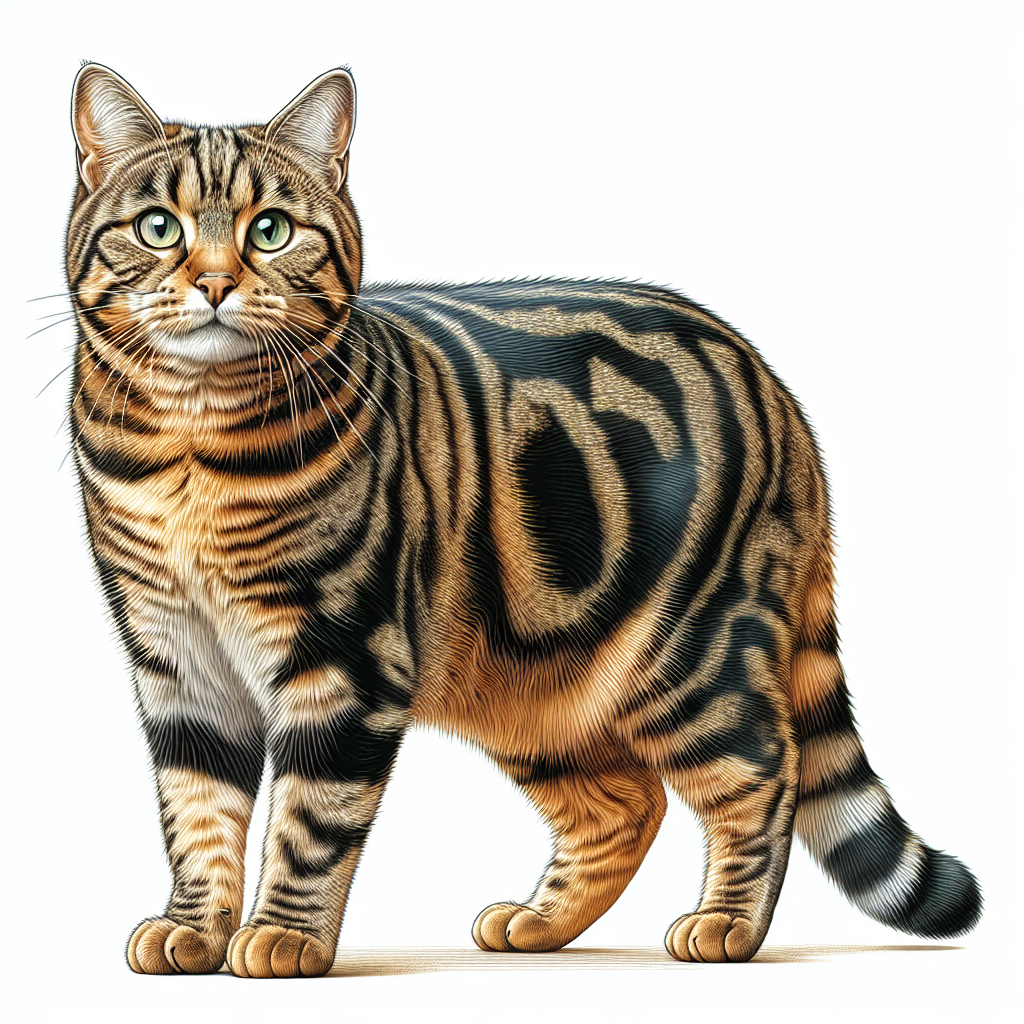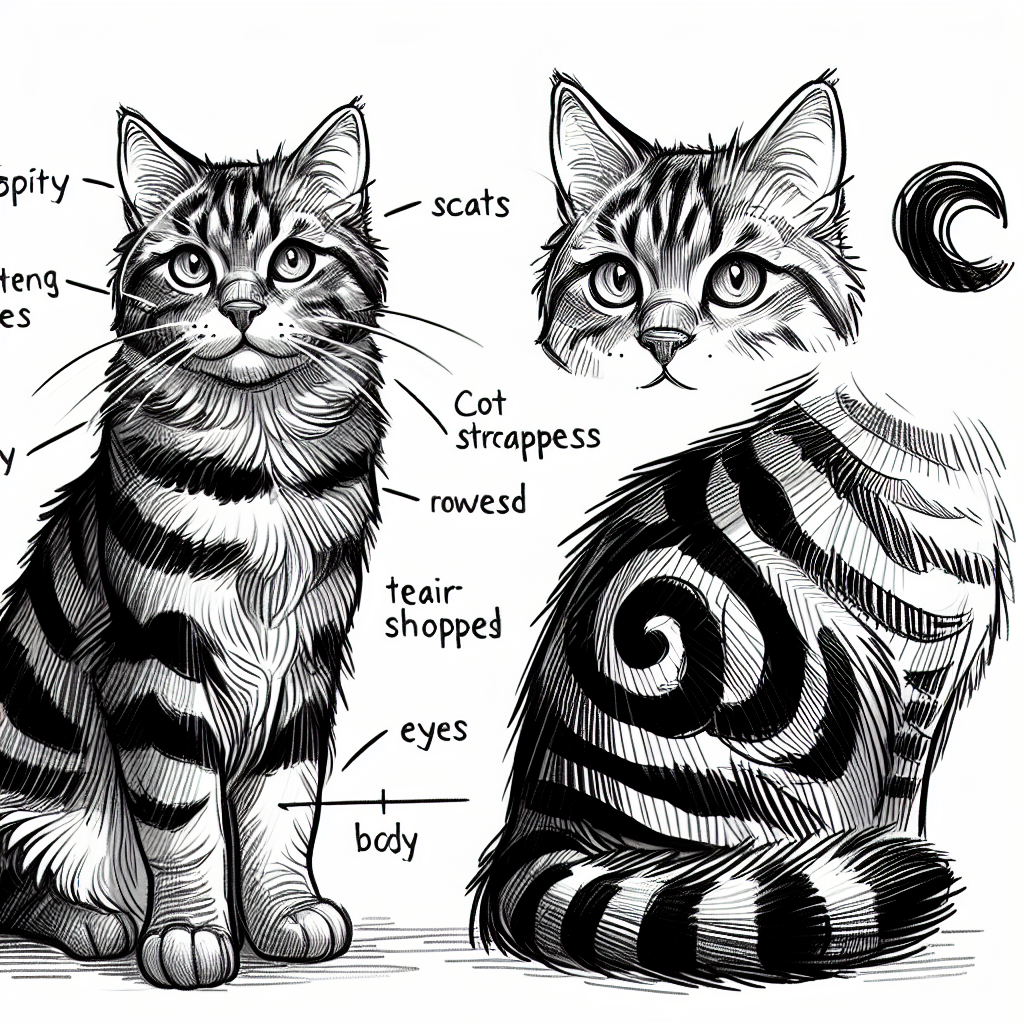Have you ever come across a cat with distinctive stripes or swirls on its fur? Chances are, you have encountered a tabby cat! Tabby cats are one of the most common and recognizable cat breeds around the world. Their beautiful coats and unique markings make them stand out in any crowd. In this article, we will explore the various characteristics that help you identify a tabby cat, from their coat patterns to their physical features. So, if you’ve ever wondered how to tell if a cat is a tabby, read on to unravel the secrets of these charming feline friends.
Coat Characteristics
Tabby cats are known for their distinct coat patterns and markings. These characteristics make them easily recognizable and add to their charm and uniqueness. Let’s explore the different coat characteristics that tabby cats can have.
Stripes
One of the most common coat patterns in tabby cats is stripes. These stripes can vary in thickness, length, and spacing. Some tabbies may have bold and pronounced stripes, while others may have more delicate, subtle ones. Striped tabbies often resemble tiny tigers, with their captivating and fierce appearance.
Mackerel Tabby
Mackerel tabbies, also known as tiger stripes, display thin, parallel stripes that run vertically along their bodies. These stripes resemble the skeleton of a fish, hence the name. Mackerel tabbies often have a pattern that resembles a “classic tabby” on their shoulders and upper back. Their beautiful markings add a touch of elegance to their overall appearance.
Classic Tabby
Classic tabbies, also called blotched tabbies, boast a pattern that resembles a bullseye or swirls on their sides. These tabbies have large, solid patches of color on their bodies, with clearly defined marbling patterns. The swirls can be seen as an intricate work of art that brings out the gracefulness of the tabby’s figure.
Spotted Tabby
Spotted tabbies, as the name suggests, have spots scattered all over their coat. These spots can vary in size and shape, ranging from small freckles to larger round spots. The pattern of spotted tabbies resembles that of a leopard or cheetah, giving them a distinctly wild and adventurous look.
Ticked Tabby
Ticked tabbies have a unique coat pattern where each individual hair is banded with multiple colors. This creates a subtle, almost shimmering effect on their fur. The tabby markings are often more pronounced on the cat’s face, legs, and tail. Ticked tabbies are known for their sleek and elegant appearance, which is enhanced by their mesmerizing coat pattern.
Patchy Tabby
Patchy tabbies, also referred to as tortoiseshell tabbies or calico tabbies, display a combination of tabby patterns and patches of solid colors. Their coats may feature areas of stripes, spots, or swirls, alongside patches of colors such as black, orange, or white. This unique blend of patterns and colors makes every patchy tabby a one-of-a-kind masterpiece.
Color Variations
Apart from the different tabby patterns, these feline friends also come in a variety of colors. Let’s take a closer look at the various color variations that tabby cats can have.
Brown Tabby
Brown tabbies are the most commonly seen color variation among tabby cats. They have warm tones of brown, caramel, and black in their fur, which often accentuate their beautiful markings. The brown tabby’s coat color can vary in intensity, ranging from a light sandy brown to a deep chocolate brown.
Gray Tabby
Gray tabbies, also known as blue tabbies, exhibit shades of gray in their coat. These tones can range from a light silver gray to a deep charcoal gray. Gray tabbies often have a mesmerizingly smoky appearance, adding an air of mystery and elegance to their overall look.
Red Tabby
Red tabbies, also referred to as orange tabbies or ginger tabbies, have vibrant and warm shades of reddish-orange in their fur. Their coats can range from a bright, fiery red to a softer, more muted copper color. Red tabbies are known for their lively and affectionate personalities, which perfectly complement their fiery coat.
Silver Tabby
Silver tabbies have a beautiful combination of silver and black in their coat. These tabbies often have a silvery-white undercoat with black or dark gray stripes. The contrast between the silver and black gives them an eye-catching and regal appearance that is impossible to ignore.
Cream Tabby
Cream tabbies showcase soft and delicate shades of cream or light beige. Their coats have warm undertones that give them a gentle and comforting aura. Cream tabbies often have lighter and more subtle tabby markings, which blend seamlessly with the creamy background.

Tabby Markings
Tabby markings play a significant role in defining the appearance of a tabby cat. Let’s explore some of the unique tabby markings that can be found on these feline beauties.
Bullseye
The bullseye marking, also known as the target or swirl marking, is commonly seen in classic tabbies. This pattern features a circular or oval-shaped mark on the sides of a tabby cat’s body. The center of the marking is usually lighter in color, with darker lines radiating outward, creating a captivating and intricate design.
Oyster
Oyster markings, also referred to as shell markings, are seen in certain tabby cats. These markings resemble a delicate seashell, with gentle curves and patterns on the cat’s sides. Oyster markings add a touch of elegance and grace to a tabby’s appearance, making them even more visually appealing.
Tiger
Tiger markings are another remarkable pattern found in tabby cats. This marking consists of bold, dark stripes running vertically along the cat’s body. The tiger pattern often covers the cat’s entire body, giving them an unmistakable resemblance to their impressive wild counterparts. Tiger markings bring out the natural beauty and strength of tabby cats.
Brindle
Brindle markings are a fusion of tabby stripes and swirling patterns. These markings create a unique blend of irregular stripes, spots, and swirls on a cat’s coat. The brindle pattern gives tabbies a distinct and eye-catching appearance that sets them apart from other cats.
Marbled
Marbled markings, as the name suggests, create a marbled effect on a tabby’s coat. These markings feature broad, irregular patches of color that blend together harmoniously, reminiscent of swirling marble. Marbled tabbies have a mesmerizing and luxurious appearance, adding an element of elegance and sophistication to their overall look.
Facial Features
In addition to their striking coat patterns, tabby cats also have distinctive facial features that contribute to their unique charm. Let’s explore these facial features in more detail.
Whisker Pads
Tabby cats often have prominent and well-defined whisker pads on their faces. These whisker pads, also known as vibrissae, are located on either side of their noses. Whisker pads play a vital role in a cat’s sense of touch and navigation. Tabby cats with pronounced whisker pads have a touch of regality to their appearance.
Muzzle
A tabby cat’s muzzle, or the area around its mouth and nose, can have various shapes and lengths. Some tabby cats may have a shorter and more rounded muzzle, while others may have a longer and more pointed one. The muzzle structure can enhance a tabby’s facial expressions and give them a distinct and charming look.
Cheek Stripes
Cheek stripes are one of the more visually captivating facial features found in tabby cats. These stripes often start from the inner corners of a tabby’s eyes and extend down their cheeks. Cheek stripes can add a touch of playfulness and intrigue to a tabby’s face, making them even more adorable and lovable.

Eye Color
The color of a tabby cat’s eyes can vary, and each eye color adds its own unique charm to their overall appearance. Let’s explore the different eye colors commonly seen in tabby cats.
Green Eyes
Green eyes are a striking and mesmerizing feature often found in tabby cats. The vibrant and intense green color can create a captivating contrast to a tabby’s fur, adding a touch of elegance and mystique to their gaze.
Yellow Eyes
Yellow eyes are another common eye color seen in tabby cats. The warm golden hue of their eyes can give tabbies an aura of wisdom and intelligence. Yellow eyes also perfectly complement their various coat patterns, bringing out the richness and depth of their colors.
Hazel Eyes
Hazel eyes, with their mixture of green, brown, and golden tones, are a captivating eye color seen in some tabby cats. These eyes can change in appearance depending on lighting conditions, adding an element of fascination and unpredictability to a tabby’s gaze.
Body Structure
Tabby cats come in various shapes and sizes, each unique in its own way. Let’s examine the different aspects of a tabby cat’s body structure.
Size
Tabby cats can come in different sizes, ranging from petite and delicate to large and muscular. The size of a tabby cat’s body can vary based on factors such as genetics, breed, and overall health. Whether they’re small and compact or big and robust, tabbies have a captivating presence that effortlessly draws attention.
Build
Tabby cats can have different body builds, each reflecting their individual characteristics. Some tabby cats may have a stocky and sturdy build, while others may be more slender and graceful in appearance. The body build of a tabby cat can influence their agility, strength, and overall physical prowess.
Muscle Tone
Muscle tone refers to the strength and definition of a tabby cat’s muscles. Some tabbies may exhibit a lean and athletic physique, showcasing well-defined muscles, particularly in their hind legs. Others may have a softer, more rounded physique, highlighting their cuddly and gentle nature. The muscle tone of a tabby cat contributes to their overall appearance and physical capabilities.
Tail Characteristics
A tabby cat’s tail is not just an extension of their body; it’s a unique and expressive feature that adds to their charm. Let’s delve into the different characteristics of a tabby cat’s tail.
Length
Tabby cats can have tails of varying lengths. Some tabby cats may have long, graceful tails that they elegantly maneuver as they move around. Others may have shorter tails that accentuate their compact and sturdy build. The length of a tabby’s tail is just another feature that distinguishes them from other cat breeds.
Shape
The shape of a tabby cat’s tail can have variations that further add to their individuality. Some tabbies may have a tail that tapers to a point, lending them a sleek and sophisticated appearance. Others may have a more rounded or fluffy tail, giving them a cuddly and whimsical touch. The shape of a tabby’s tail is another aspect that makes them all the more captivating.
Behavior Traits
Tabby cats are not just known for their physical attributes; they also have unique behavior traits that make them delightful companions. Let’s explore some of the behavior traits commonly seen in tabby cats.
Temperament
Tabby cats are often known for their friendly and affectionate temperament. They tend to be sociable and enjoy human company, making them wonderful companions. Tabby cats are known for their ability to adapt to different environments and get along well with people of all ages, including children.
Playfulness
Tabby cats have a playful nature that never fails to capture the hearts of cat lovers. They enjoy interactive play, chasing toys and balls, and engaging in stimulating activities. Their playful antics can provide endless entertainment and joy to their human companions.
Independence
Tabby cats also possess a sense of independence that allows them to explore and navigate their surroundings with confidence. While they enjoy human companionship, they also appreciate their alone time and can entertain themselves when needed. The independent nature of tabby cats allows them to maintain a healthy balance between socializing and enjoying their personal space.
Vocalizations
Tabby cats have a unique way of communicating with their humans through various vocalizations. Let’s explore some of the vocalizations commonly heard from tabby cats.
Meow
The meow is perhaps the most recognizable vocalization made by tabby cats. Their meows can vary in pitch, tone, and volume, conveying different messages. From a gentle and soft meow to a demanding and insistent one, tabby cats use their meows to express their needs, desires, and emotions.
Purr
Purring is a soothing and comforting sound that tabby cats often produce when they are content and relaxed. It’s a gentle vibration that can be felt when stroking or cuddling with a happy tabby. The purr is a reassuring sound that lets their human companions know they are loved and appreciated.
Chirp
Tabby cats may also emit chirping sounds, which are short and high-pitched vocalizations. Chirping often happens when tabby cats are excited or observing something of interest, such as a bird outside a window. It’s a unique sound that adds to the charm and playfulness of tabby cats.
Life Expectancy
Tabby cats, like all feline companions, have varying lifespans. Several factors can influence the life expectancy of a tabby cat. Let’s explore this topic in more detail.
Average Lifespan
On average, tabby cats can live anywhere from 12 to 16 years. However, with proper care, nutrition, and regular veterinary check-ups, it’s not uncommon for tabby cats to exceed this average lifespan. Each tabby cat is unique, and genetics, lifestyle, and overall health play crucial roles in determining their individual life spans.
Factors Affecting Lifespan
Several factors can affect a tabby cat’s lifespan. Proper nutrition and a balanced diet are vital for their overall health and longevity. Regular exercise and mental stimulation can also contribute to their well-being. Additionally, routine veterinary care, such as vaccinations and preventive treatments, can help identify and address any potential health issues early on, ultimately impacting a tabby cat’s lifespan positively.
In conclusion, tabby cats are a remarkable breed with unique coat characteristics, markings, and physical features. Their charming personalities, playfulness, and distinctive vocalizations make them beloved companions. By understanding the various aspects that define a tabby cat, you can appreciate their individuality and enjoy the extraordinary journey of being a tabby cat parent.

